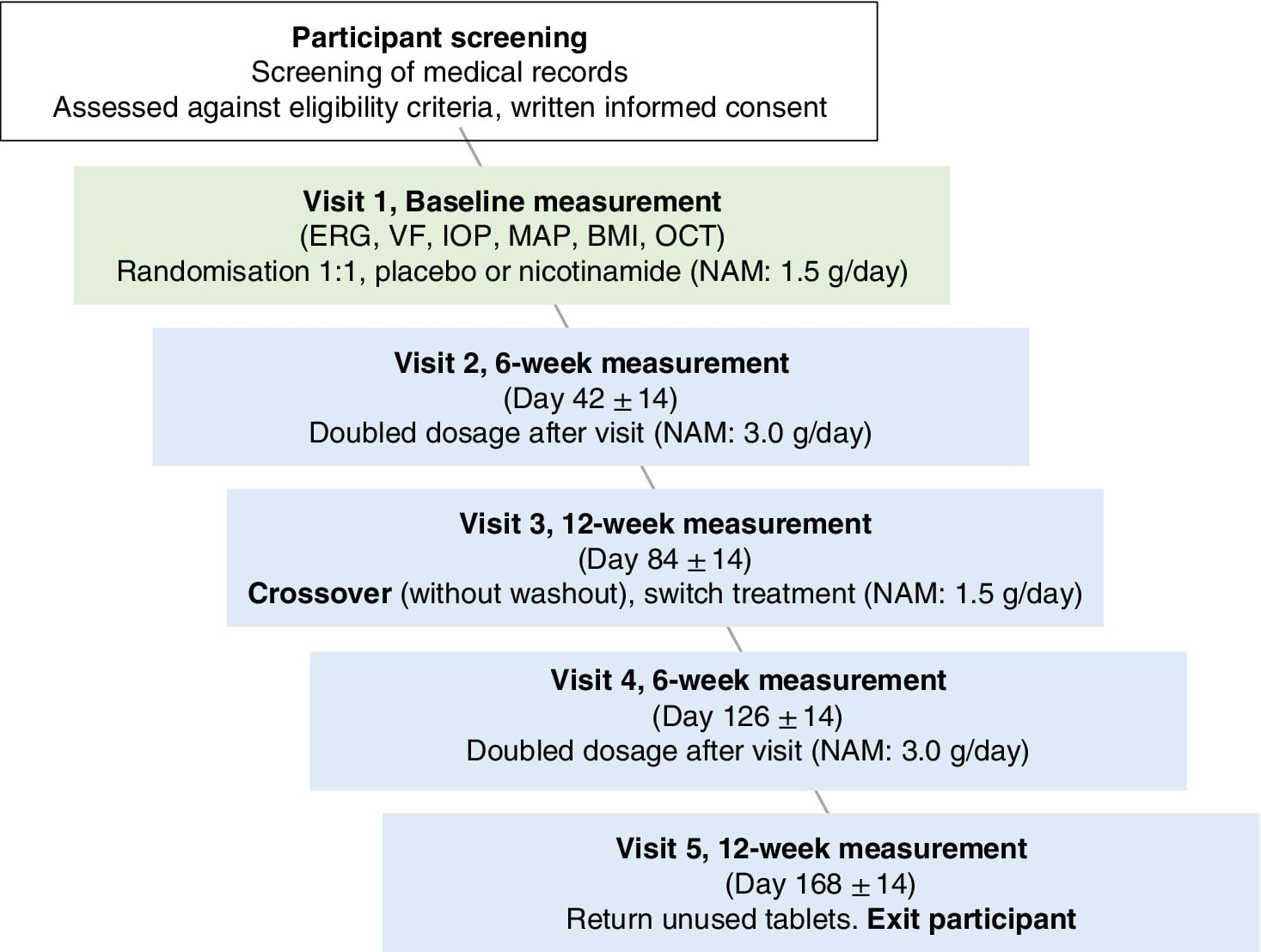Glaucoma is the leading cause of irreversible blindness worldwide, characterized by gradual dysfunction and loss of retinal ganglion cells and their axons which make up the optic nerve.
The disease has a range of risk factors, including age, genetics, and elevated intraocular pressure (IOP), yet clinically available treatment strategies target only IOP‐lowering, and do not directly address the neurodegenerative events at the level of the retina and optic nerve.
Vitamin B3, or nicotinamide, is a precursor of NAD+ (nicotinamide adenine dinucleotide) and is a critical coenzyme found in every cell in the body, involved in hundreds of metabolic processes. Recent work has indicated that glaucoma patients are low in NAD+ serum.
While retinal ganglion cells endure significant metabolic stress in glaucoma but maintain capacity to recover function, and B3 supplementation provides robust protection of retinal ganglion cells in preclinical models. However, the potential of nicotinamide in human glaucoma is unknown.
To determine whether functional improvements observed with NAM supplementation in mice could be reproduced in humans with glaucoma in an interventional study, researchers from the Center for Eye Research Australia (CERA) conducted interventional research.
The new study, published in Clinical and Experimental Ophthalmology, found promising results in the visual function of glaucoma patients who received a daily high dose of 3 grams of B3 for 12 weeks in addition to their regular treatment to reduce eye pressure. The research suggests B3 helps protect against nerve cell damage that leads to blindness in glaucoma.
The trial was led by Professor Jonathan Crowston and Dr. Flora Hui at the Center for Eye Research Australia. The study also included researchers from the University of Melbourne, Duke NUS-Medical School, Singapore Eye Research Institute, Karolinska Institutet, University of Adelaide and Cambridge University, and was conducted with glaucoma patients in Melbourne at private ophthalmic clinics and the Royal Victorian Eye and Ear Hospital.
The study
Over the course of the study, 57 glaucoma patients received both placebo and vitamin B3. Participants underwent 6 weeks of 1.5 g/day then 6 weeks of 3.0 g/day. After 12 weeks, participants crossed over without washout.

All participants were seen at baseline and reviewed during six‐weekly visits. At each visit, participants underwent a standard clinical examination, including measurement of visual acuity, IOP, blood pressure and slit lamp examination.
To determine the visual function of patients, researchers used a diagnostic test which measures electrical activity in the cells of the retina called electroretinography. To monitor any changes, visual field testing was also conducted.
Findings
The results found "significant improvement" in the visual function of glaucoma patients who received a daily high dose of 3 grams of B3 for 12 weeks in addition to their regular treatment to reduce eye pressure. In some, high-dose B3 greatly improved how nerve cells were functioning in the eye.
"For the first time, we have shown that daily high doses of vitamin B3 can lead to early and significant improvements in patients who are also receiving traditional treatments to lower eye pressure,'' said Hui. "Like adding oil to a car engine to allow it to run smoothly, vitamin B3 could be used to protect cells from damage and help those that have been affected by glaucoma work better.'' Hui added that there should be a larger international trial to determine if the improvement shown in this study could be sustained over the longer term to reduce the progression of glaucoma.
Professor Jonathan Crowston, who led the study at CERA and is now at Duke-NUS Medical School and Singapore Eye Research Institute, agrees: "We now need a longer term study to know conclusively whether nicotinamide delays glaucoma progression more than simply using eye pressure lowering medications alone. A larger study will help us determine whether vitamin B3 should be taken on an ongoing basis by glaucoma patients."
Earlier pre-clinical research in the United States found that vitamin B3 could prevent optic nerve degeneration—but this is the first time similar results have been witnessed in a human trial.
To assess whether these improvements can help reduce disease progression over a longer period of time, a larger trial is now being designed.
Source: Clinical & Experimental Ophthalmology
(2020). DOI: 10.1111/ceo.13818
“Improvement in inner retinal function in glaucoma with nicotinamide (vitamin B3 ) supplementation: A crossover randomized clinical trial”
Authors: F. Hui et al.




